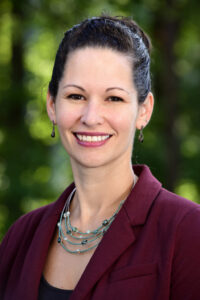 From a degree in microbiology to my current role as a Science Editor at an environmental health sciences journal—and all the steps in between—I have a unique career journey. Or so I thought. The more I’ve talked with colleagues and peers, the more I realize that the surprising twists and turns of my journey are what make it familiar, almost ordinary, in today’s world.
From a degree in microbiology to my current role as a Science Editor at an environmental health sciences journal—and all the steps in between—I have a unique career journey. Or so I thought. The more I’ve talked with colleagues and peers, the more I realize that the surprising twists and turns of my journey are what make it familiar, almost ordinary, in today’s world.
I started out, like many new undergrads, changing my major on the first day. I had gone in thinking “computer science” but had second thoughts and switched to microbiology after skimming a list of options on a single-sided, nondescript piece of 8 ✕ 10 paper. I worked hard, did the grunt work (washing dishes and making fly food), completed two internships, and was ultimately accepted into graduate school. My destiny as a scientist awaited!
The SciComm Class That Changed My Life
On a whim in grad school, I took a class on scientific communication; we critiqued our colleagues’ posters, talked through how to improve the presentation of papers in highly esteemed journals, and discussed ways to improve our own communication styles. This single class changed my entire view of the world. I had believed that anything in print was a model of perfection—as good as it was going to get. Once I learned this was not the case, I challenged myself to see content not as it was, but what it could be.
Fast-forward to a postdoctoral position at the Mayo Clinic: I loved the work but became frustrated with the bench science environment. Somewhere along the way, I began editing colleagues’ manuscripts. Mind you, at this point I had no formal (or informal) training in editing or copyediting, but I had a knack for revising text to make a point clearer or the paper flow better. I saw an opportunity to make extra money, so I took to the internet to find freelance work. I was rejected by 50 jobs for every one that I secured, primarily editing manuscripts by non-native English speakers, which was a refreshing challenge. Interpreting a manuscript and recommending revisions for clarity and flow felt like solving a riddle.
I was fortunate to have a mentor who fostered my love of editing. When our grant money ran low, she secured a part time position for me at Mayo as a departmental editor.
Transition to Editing
I knew that I didn’t want to write grants for a living—I am an editor, not a writer! So I decided at this point to go all in and seek a career in editing. I already had a lot of experience between the Mayo Clinic and freelancing for online companies (Cactus.com, American Manuscript Editors). Then a most unlikely meeting changed my career trajectory: My father-in-law reconnected with his cousin, whose partner just happened to work for a vendor in academic publishing. The vendor was looking for a PhD to write a sample for a request for proposal (RFP) from a major publisher. I wrote the sample, they won the bid, and I got a new freelancing client.
Just as my grant was coming to an end, the vendor offered me a full-time position as Editorial Director. This was my dream job—more money and relocation to North Carolina, where I had always wanted to live. Could it get any better? As it turned out, yes it could. I worked upwards of 90 hours a week to keep up in a position for which I was not qualified. And managing staff and freelancers taught me very quickly that I was made to manage projects, not people. I was overworked and burnt out, then we ran out of work and I was laid off. Cue simultaneous heartbreak and joy.
Current Position
Fortunately, I was well positioned to find freelance clients. Along the way, I took copyediting tutorials and various courses to strengthen my skills. Eventually, a recruiter on LinkedIn contacted me about a job at an academic journal. One look at the description and I knew I was made for the job and it for me. I would be reviewing manuscripts for suitability for peer review and content editing those that passed. I could stay connected to the science and perform the developmental/content editing that I loved, without having to manage people. I interviewed and was offered the position on the spot.
After nearly 6 years, I can’t imagine being anywhere else. Looking back on my complicated path, I realize that every position I held, every class I took, every job for which I was turned down provided valuable experience and knowledge that I needed to succeed in my current role. I continue to seek opportunities to grow as an editor and a person, earning my Editor in the Life Sciences (ELS) certification from the Board of Editors in the Life Sciences and becoming more involved in CSE. It is important to me to stay connected to this community because as I’ve learned, you never know when or from whom your next opportunity will come. If there is one lesson I’ve learned through my conventionally unique journey, it is this: don’t let where you have been define where you go.
Kristin Inman is Science Editor, Environmental Health Perspectives.
Opinions expressed are those of the authors and do not necessarily reflect the opinions or policies of the Council of Science Editors or the Editorial Board of Science Editor.
